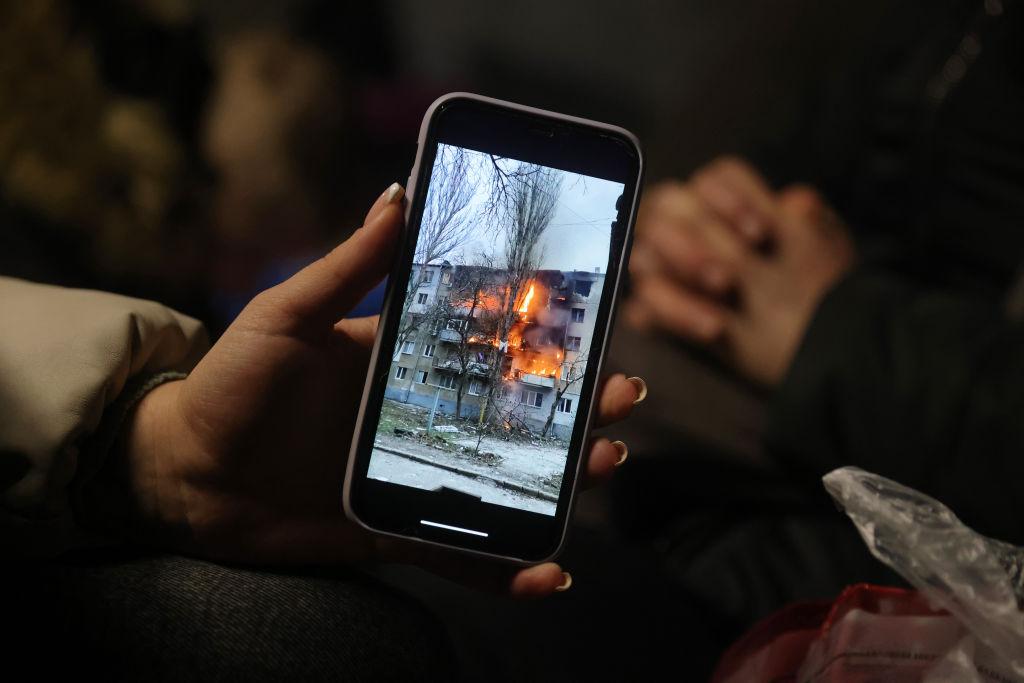
So much for the ‘hot peace’ scenario of power relations in the post-post-Cold War era. In extremis, the Russia–Ukraine conflict spotlights the interwoven strategic and tactical issues associated with cybersecurity and disinformation campaigns, the virality of misinformation, and the anarchic realm of social media.
As we approach another election in Australia, it’s timely to reconsider the relationship between agencies of cybersecurity, diplomacy and political communication, including multiplatform international broadcasting. Although the Australian people face no imminent existential crisis, unlike the people of Ukraine (or Afghanistan or Yemen), the West’s ‘holiday from history’ is a fast-receding memory and, as the government argues, sharp power and grey-zone threats multiply with greater complexity and proximity.
The war in Ukraine has offered acute demonstrations of familiar verities and new complexities. Through clarity, resolve and authenticity of communication, Ukrainian President Volodymyr Zelenskyy has personified core aspects of national power as identified by the realist scholar Hans Morgenthau: national character, morale, the quality of diplomacy and the quality of government. Also of note, Arnold Schwarzenegger’s scripted video message to the people of Russia offers a celebrity masterclass in delivering a counternarrative about the war’s causation and conduct.
The many participants in this information war have different allegiances, propagate contested narratives and, in numerous cases, operate outside state control. Even in outright war, these actors can be persuasive, act as force multipliers or heighten the risks of public alienation, panic and conflict escalation.
Public–private partnerships have been important in combating malware attacks targeted not only at critical infrastructure but also at social scaffolding. Writing in the New York Times, David Sanger likened the role of Microsoft in the Ukraine war to that of the Ford Motor Company in World War II when it converted automobile production lines to turn out Sherman tanks.
An onslaught of cyberattacks by swarms of volunteers from around the globe has blurred the boundaries between ‘patriotic amateurs’ and state-backed hackers. The volunteers acted in support of Ukraine or Russia, creating ‘widespread disruption, confusion and chaos’, with the risk of provoking further retaliation and an escalation of conflict.
The ubiquity of near real-time imagery of the Russian assault from among the three-quarters of the Ukrainian population equipped with smartphones makes this a war unlike any other. As The Economist observes, social networks not only spread information—and disinformation—but also encourage members to express their own views, ‘turning them more easily into participants’.
State-owned international broadcasters such as the BBC have recognised the imperative to reach audiences in Russia and Ukraine to counter Kremlin propaganda, no matter what barriers to entry there might be as a result of political censorship or technological disruption. Vatican Radio and the BBC boosted their long-distance shortwave radio transmissions to reach Russian- and Ukrainian-speaking audiences after the Kremlin blocked the British broadcaster’s online channels.
Even in the era of ostensibly secure virtual private networks, shortwave radio offers unique attributes: the ability to transmit free to air over thousands of kilometres without interference; the ability to be heard from cheap and widely available portable radio receivers with long-lasting battery capacity; and the guarantee of privacy because, unlike internet-based services and mobile telephony, the location of the radio receiver remains virtually untraceable.
Far from the theatre of physical conflict, pro-Russian narratives and lingering cynicism towards the US and its Western allies still figure in public discourse. The mixed reactions of Asian countries mean the West can’t assume that democracies and other like-minded countries are united over the Ukraine tragedy.
Even in less extreme circumstances, the contest to frame reality and promote rival visions of the international order takes on a complex multidimensional character. Prime Minister Scott Morrison has acknowledged that the long struggle ahead is ideational as much as it is about the relativities of hard power and technological advantage. Among five areas requiring Australian ‘advocacy and agency’, Morrison includes support for open societies, open economies and the rules-based order; cooperation on global challenges; and demonstration that democracies work. Easier said than done.
Australian international relations expert Allan Gyngell writes that it’s difficult to fit values into foreign policy, especially when a nation is under stress. But one test of democratic legitimacy is the extent to which hypocrisy is kept within tolerable limits by striving to reconcile the state’s interests and its espoused values. This calls for both hard-power discipline and the modelling and projection of foundational democratic principles.
To that end, more is required for a joined-up national strategy that accommodates technology-focused and cybersecurity functions along with manifestations of social and discursive power. In defending against disinformation and contested narratives, we need to think comprehensively. An incoming government should consider establishing a forum for high-level strategic coordination, research and analysis, with eyes on the whole gameboard. It would be informed by but separate from high-security government institutions and able to liaise across the government and non-government sectors.
We need at once to focus on the hard business of cyber defence as well as activities of long-term trust-building and real-time information interventions. I have a particular interest in multiplatform international broadcasting. It remains a statutory function of the ABC but survives in a greatly diminished state compared with its politically influential past as a multilingual regional force in Asia and the Pacific. Elsewhere I have lamented the loss of institutional memory over recent decades and advocated a reappraisal of the latent institutional capacity of the ABC to help shape Australia’s international environment.
What yesterday appeared to be ‘so Cold War’ has become ‘so now’.